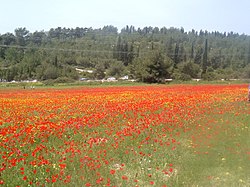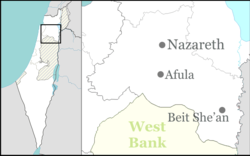|
Ein HaShofet
Ein HaShofet (Hebrew: עֵין הַשּׁוֹפֵט, lit. Spring of the Judge) is a kibbutz in northern Israel. Located in the Menashe Heights region around 25 km southeast of the city of Haifa, close to Yokneam, it falls under the jurisdiction of Megiddo Regional Council. In 2022 it had a population of 864.[1] Ein HaShofet was established by two Hashomer Hatzair groups from Poland and Highland Mills, New York. They first settled the hill of Jo'ara in 1937 and moved to the current location in 1938. "Ein HaShofet," literally, Judge's Spring, was named in honor of United States Supreme Court Justice Louis D. Brandeis (1856-1941), who played a leading role in the American Zionist movement.[2] There is a flowing spring nearby the kibbutz.[3] The kibbutz owns three industrial companies which produce metal parts, mostly for vehicles, and lighting products on a global scale. GeographyEin HaShofet is located on the Menashe Heights, 5 kilometers south of the city of Yokneam Illit. Other places near Ein HaShofet include the kibbutzim of Ramat HaShofet, Dalia and the hill of Jo'ara. The kibbutz is accessed through the 6954 and 6953 roads, connected to Highway 66 and regional route 672.[2][4] HistoryBritish MandateThe founders of the kibbutz came from two groups. The first group was called "Banir" and consisted of Hashomer Hatzair graduates from Poland. The group formed in 1931 in Częstochowa and arrived to Mandatory Palestine in 1935. It received training in Ein HaHoresh. The other group also consisted of Hashomer Hatzair graduates from Highland Mills, New York. The group formed in 1922 and arrived to Mishmar HaEmek in 1931, where it received agricultural training.[5] Their number was 17 in 1931 and it rose to 30 in 1933. In 1934 they moved to Hadera.[6] In May 1934 both groups united in Hadera under the name "Banir-America" and worked together in the town.[5] The initial location of the kibbutz was the hill of Jo'ara, about one kilometer from the current location of the kibbutz.[7] It was owned by an Effendi from a family called Salah, residing in Haifa, and was populated by Arab tenant farmers.[8] In 1936, the Jewish National Fund bought the land from the effendi and paid each sharecropper for their evacuation.[9] The funds for the deal were raised by Louis D. Brandeis, a United States Supreme Court Justice lawyer, and a prominent Zionist figure. The Americans donated 70,000 USD for the cause, with 50,000 coming from Brandeis himself.[10] The kibbutz was named in his honor. On 5 July 1937 some of the members departed from Mishmar HaEmek, escorted by the Haganah, and arrived to the hill of Jo'ara. The kibbutz was established a part of the Tower and Stockade settlement drive.[11] Built on JNF land with the help of the Keren Hayesod company, it was the first Jewish settlement on the Menashe Heights.[7] Their departure was celebrated in Mishmar HaEmek, from where they brought dismantled structures, equipment for building a wall, and trees for planting. The climb was done on foot, as there was no paved road to the top of the hill. During the following winter the way to the hill was blocked and the members paved a new access road.[9] The members stayed on the hill for one year before moving to the current and final location of the kibbutz.[5] They left the hill of Jo'ara after realizing it was too small. It was handed to the Haganah militia.[10] The construction of, the first permanent building took place in June 1938[12] and in October the rest of the members from Hadera and Jo'ara joined the kibbutz in its final location. Many members joined the Haganah paramilitary organization and the Notrim Jewish police force.[5] In 1945, Ein HaShofet had a population of 320, all Jews. It was noted that it was the village formerly named Ji'ara (i.e. Jo'ara).[13][14] Despite a lack of water and hilly difficult reclamation, in 1948, with a population of 450, they "were a successful mixed hill farm with orchards, dry cereals, dairy products, sheep herding and chicken farming."[15] During the Jewish insurgency in Mandatory Palestine, Ein HaShofet housed a factory for explosives used by the Jewish militia against the British.[5] During the 1948 Arab-Israeli war, the Ein HaShofet villagers helped to defeat Fawzi al-Qawuqji's forces after their April 1948 attack on Mishmar HaEmek.[15] State of IsraelUntil 1962, the kibbutz absorbed five other groups. Two of them were made of Holocaust survivors and the other are youth groups from Israel.[16] EconomyThe primary component of Ein HaShofet's economy is its industry with three working factories in the kibbutz. According to the 2008 national census,[17] 43% of the workers work in the kibbutz's industrial sector. The secondary component and historically the center of the kibbutz life is agriculture, which employs 20 members of the kibbutz in five different sectors.[18] IndustryThe kibbutz owns three industrial companies through the Ein-Hashofet Industries Group.
Agriculture
ArchaeologyNumerous burial caves have been discovered at Dhaharat el-Marshafa, a site situated to the east of Ein HaShofet. Within one of them, a funerary inscription in either Hebrew or Aramaic was found carved into the wall, adorned with traces of red paint. Another discovery from Ein HaShofet is an octagonal bronze ring engraved with Samaritan letters, although only a portion of it remains legible. It is speculated that this ring may have been used for mystical or magical purposes.[23] The local museum displays amphoras with Greek dipintos dating back to the 1st and 2nd centuries AD.[23] Gallery
References
External links
|
||||||||||||||||||||||||||||
Portal di Ensiklopedia Dunia










